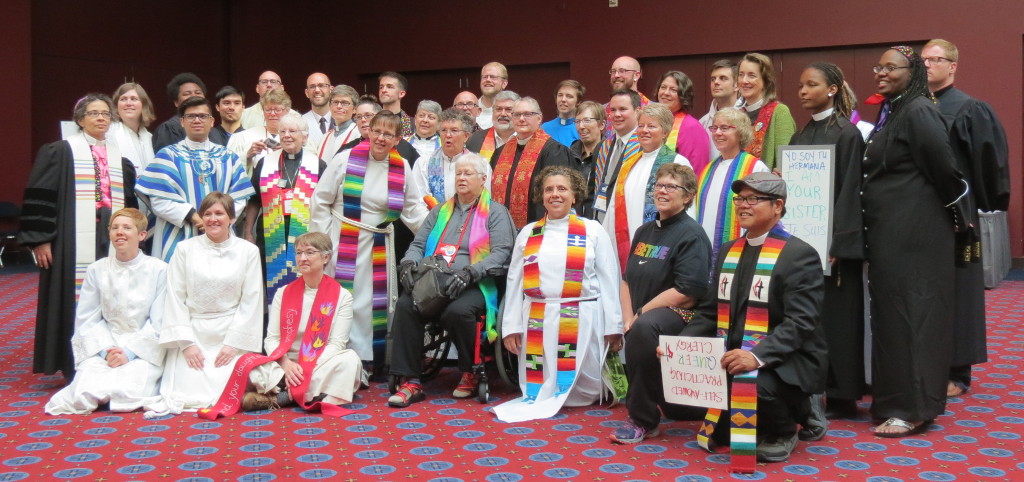As we prepare to leave General Conference, we are exhausted. It is difficult to say if we “won” or “lost.” Like four years ago, we feel like we squeaked by a total splintering of the denomination. People on both ends of the spectrum expected the church to melt down. In the end, we learned a bit more about who are our friends.
After a series of marches and actions by the Love Your Neighbor Coalition (LYNC), the General Conference voted to have the Council of Bishops lead the church by bringing in a recommendation for action.
The next day, they presented a report with a recommendation to create a Commission to examine all paragraphs in the United Methodist Book of Discipline that relate to human sexuality. The Commission is to bring in recommendations to a special General Conference to be held in two or three years.

The bishops will appoint members of the Commission. In the press conference immediately after the recommendation was presented to the conference, Bishop Ough, the incoming President of the Council of Bishops said, "This commission that we would form will be sure that all voices are present."
Despite efforts to call the vote out of order because it was a report, not a motion, and another effort to say that we didn’t follow the rules for actions with financial implications, the vote stood.
In Bishop Ough’s first address to the General Conference where he said, “collectively we have a broken heart...This brokenness is centered on matters of human sexuality, the interpretation of scripture, and the inclusion of our LGBT brothers and sisters….The Council of Bishops is committed to the unity of The United Methodist Church… a unity that is not afraid of the church and is respectful of all. At the same time, we remain open to new and innovative ways to be in unity.”
In a follow up press conference after presenting the bishop’s report and recommdation, Bishop Ough called for deep conversations in spaces that do not carry with them the possibility of recrimination and punishment. He said, "The fear is that you can't be honest with one another for fear that someone will try to get you."
For LGBTQI persons, those spaces don't exist in this denomination and can't as long as the present rules are enforced. Any gay, lesbian, bisexual, queer, or even transgender or intersex clergy who comes out in this climate risks losing their credentials and their livelihoods. That is the very definition of oppression. And LGBTQI persons are the only persons who are singled out by the language of “incompatible with Christian teaching.” Transgender pastors may be accepted at first but they are often assigned toxic congregations—and if they make something of the congregation, they are not encouraged.
Openly LGBTQI clergy voices can only be heard if there is a moratorium on the “gotchas” for LGBTQI clergy built into the current language that is condemning, restrictive, and punitive. Otherwise the conversations about LGBTQI people and human sexuality cannot have the integrity, depth, and honesty that is desired. The Commission could model a more true, honest and even holy dialogue about human sexuality. These conversations shared with humility and honesty about fears, vulnerabilities, and experiences could provide a new path where the Holy Spirit can break through.
ACTION: Please write to Bishop Ough as President of the Council of Bishops to urge him to:
- Appoint an Affirmation leader to the Commission
- Appoint an African LGBTQI person of faith
- Appoint an openly gay clergy
- Appoint an openly transgender clergyperson
So, the answer to the question, “Are we there yet?” is “no,” but we on our way. We will go together with newfound friends and perhaps a deeper faith.
Read the whole issue (PDF)
